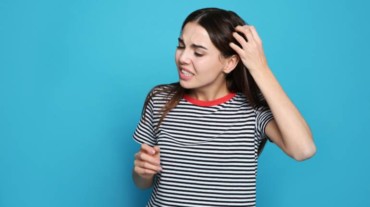You can have an itchy scalp and experience hair loss at the same time. It may have to do with health conditions. We tell you what can possibly cause itchy scalp and hair loss.
Having an itchy scalp can make it difficult to focus on anything. Sometimes, it is even accompanied by hair loss, which is characterised by the partial or complete absence of hair from areas of the body where it normally grows, including the head. This combination of itchy scalp and hair loss may be due to a health conditions such as eczema or scalp ringworm. Your hormones may also have a role in this dual problem. Getting rid of itchy scalp and hair loss begins with finding out the cause. Read on to know what can possibly cause your scalp to itch and hair to fall out at the same time.
What are the causes of itchy scalp along with hair loss?
Itchy scalp accompanied by hair loss can be caused by various factors. Here are possible causes:
1. Atopic Dermatitis (Eczema)
Atopic dermatitis or eczema is a chronic inflammatory skin condition that can affect the scalp. It can cause redness, itching, and scaling. In severe cases, scratching may lead to hair loss, says dermatologist Dr Pawan Singh.

2. Sensitive scalp
During a 2018 review published in the Skin Appendage Disorders journal, it was found that itch was present in 60 percent of patients with sensitive scalp, which is characterised by burning or tingling sensation on the scalp. Hair loss is also associated with sensitive scalp.
3. Alopecia areata
Alopecia areata is an autoimmune condition, which is characterised by patchy hair loss. It occurs when the immune system attacks hair follicles by mistake, leading to sudden hair loss and possibly itching on the scalp.
Also Read

4. Tinea capitis (scalp ringworm)
Tinea capitis or scalp ringworm is a fungal infection of the scalp. Dermatophyte fungi is the reason behind this infection. It can lead to itching, redness, scaling, and hair loss in affected areas. In severe cases, ringworm infections can cause permanent hair loss, says the expert.
5. Lichen planopilaris
Lichen planopilaris is a rare inflammatory condition that affects the hair follicles, leading to scarring and hair loss. It can cause itching, burning, and tenderness of the scalp, along with progressive hair thinning and bald patches.
6. Contact dermatitis
Contact dermatitis occurs when the skin comes into contact with an irritant or allergen, resulting in inflammation and itching. Common triggers include hair care products, dyes, and chemicals applied to the scalp. Prolonged exposure to irritants may lead to hair loss, says the expert.
7. Folliculitis
Folliculitis is a bacterial or fungal infection of the hair follicles, leading to inflammation, redness, itching, and sometimes hair loss. It can occur on the scalp and other areas of the body, particularly in people with weak immune systems.
8. Hormonal imbalances
Fluctuations in estrogen and testosterone levels can contribute to scalp itching and hair loss. Hormonal changes may affect the hair growth cycle and lead to thinning or shedding of hair along with itching.
9. Nutritional deficiencies
Inadequate intake of essential nutrients like vitamins, and proteins can impact the health of the scalp and hair follicles. Deficiencies in nutrients such as iron, zinc, vitamin D, and B vitamins may contribute to scalp itching and hair loss.
10. Dandruff
Dandruff, a condition that causes the skin on the scalp to flake, can lead to itching. It is rare, but it can cause hair loss too. It happens only if a person does not treat it, and scratches the scalp a lot.

How to treat hair loss and itchy scalp?
Medications and home remedies can help in treating hair loss and alleviating symptoms of an itchy scalp:
1. Minoxidil
Minoxidil is a topical medication that stimulates hair growth and slows down the progression of balding. It works by dilating blood vessels in the scalp, which increases blood flow to the hair follicles and promotes hair growth, says Dr Singh.
2. Finasteride
Finasteride is an oral medication that inhibits the enzyme responsible for converting testosterone into dihydrotestosterone (DHT). By reducing DHT levels in the scalp, finasteride helps to slow down hair loss and may even promote hair regrowth in some people.
3. Corticosteroids
Corticosteroids are anti-inflammatory medications that can be applied topically, injected, or taken orally. They are used to reduce inflammation and itching associated with conditions such as psoriasis, eczema, and alopecia areata. Corticosteroids work by suppressing the immune response and reducing inflammation in the scalp.
4. Antibiotics and antifungals
Antibiotics and antifungal medications are used to treat bacterial or fungal infections of the scalp, such as folliculitis or tinea capitis (scalp ringworm). These medications work by targeting and eliminating the underlying microbial infection, which in turn resolves symptoms of itching, and hair loss.
5. Coconut oil
Coconut oil serves as a potent moisturiser, especially for those with dry scalp. It nourishes the scalp and strengthens hair follicles to combat hair breakage.
6. Tea tree oil
Tea tree oil is widely used in skincare and hair care products due to its antifungal and antibacterial properties. It effectively targets scalp infections that may lead to itching and dandruff, says the expert.
Before using a natural ingredient on your scalp, conduct a patch test.
Itchy scalp and hair loss can be due to many reasons, including dandruff and eczema. Medications and home remedies can help to combat hair loss and itchy scalp. Bur if you experience persistent scalp issues or significant hair loss, talk to a doctor.